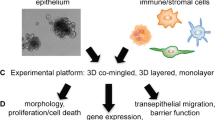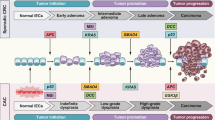Abstract
Chronic inflammatory disorders are often associated with an increased risk of developing cancer. A classic example of the connection between inflammation and cancer is the increased risk of colorectal cancer in patients with inflammatory bowel disease (IBD). In this review, we discuss aspects of IBD that promote colorectal cancer and highlight key molecular mediators that contribute to cancer risk. Additionally, we report on progress in identifying molecular targets that may prove efficacious in blocking the progression of IBD-related inflammation to cancer.
Similar content being viewed by others
References and Recommended Reading
Gupta RB, Harpaz N, Itzkowitz S, et al.: Histologic inflammation is a risk factor for progression to colorectal neoplasia in ulcerative colitis: a cohort study. Gastroenterology 2007, 133:1099–1105.
Itzkowitz SH, Harpaz N: Diagnosis and management of dysplasia in patients with inflammatory bowel diseases. Gastroenterology 2004, 126:1634–1648.
Rutter M, Saunders B, Wilkinson K, et al.: Severity of inflammation is a risk factor for colorectal neoplasia in ulcerative colitis. Gastroenterology 2004, 126:451–459.
Sands BE: Inflammatory bowel disease: past, present, and future. J Gastroenterol 2007, 42:16–25.
Hugot JP, Chamaillard M, Zouali H, et al.: Association of NOD2 leucine-rich repeat variants with susceptibility to Crohn’s disease. Nature 2001, 411:599–603.
Ogura Y, Bonen DK, Inohara N, et al.: A frameshift mutation in NOD2 associated with susceptibility to Crohn’s disease. Nature 2001, 411:603–606.
Hampe J, Franke A, Rosenstiel P, et al.: A genome-wide association scan of nonsynonymous SNPs identifies a susceptibility variant for Crohn disease in ATG16L1. Nat Genet 2007, 39:207–211.
Parkes M, Barrett JC, Prescott NJ, et al.: Sequence variants in the autophagy gene IRGM and multiple other replicating loci contribute to Crohn’s disease susceptibility. Nat Genet 2007, 39:830–832.
Fisher SA, Tremelling M, Anderson CA, et al.: Genetic determinants of ulcerative colitis include the ECM1 locus and five loci implicated in Crohn’s disease. Nat Genet 2008, 40:710–712.
Franke A, Balschun T, Karlsen TH, et al.: Sequence variants in IL10, ARPC2 and multiple other loci contribute to ulcerative colitis susceptibility. Nat Genet 2008, 40:1319–1323.
Shih DQ, Targan SR: Immunopathogenesis of inflammatory bowel disease. World J Gastroenterol 2008, 14:390–400.
Herschman HR, Xie W, Reddy S: Inflammation, reproduction, cancer and all that…. The regulation and role of the inducible prostaglandin synthase. Bioessays 1995, 17:1031–1037.
Eberhart CE, Coffey RJ, Radhika A, et al.: Up-regulation of cyclooxygenase 2 gene expression in human colorectal adenomas and adenocarcinomas. Gastroenterology 1994, 107:1183–1188.
Sinicrope FA, Gill S: Role of cyclooxygenase-2 in colorectal cancer. Cancer Metastasis Rev 2004, 23:63–75.
Jacoby RF, Seibert K, Cole CE, et al.: The cyclooxygenase-2 inhibitor celecoxib is a potent preventive and therapeutic agent in the min mouse model of adenomatous polyposis. Cancer Res 2000, 60:5040–5044.
Oshima M, Murai N, Kargman S, et al.: Chemoprevention of intestinal polyposis in the Apcdelta716 mouse by rofecoxib, a specific cyclooxygenase-2 inhibitor. Cancer Res 2001, 61:1733–1740.
Tsujii M, DuBois RN: Alterations in cellular adhesion and apoptosis in epithelial cells overexpressing prostaglandin endoperoxide synthase 2. Cell 1995, 83:493–501.
Sun Y, Tang XM, Half E, et al.: Cyclooxygenase-2 overexpression reduces apoptotic susceptibility by inhibiting the cytochrome c-dependent apoptotic pathway in human colon cancer cells. Cancer Res 2002, 62:6323–6328.
Li G, Yang T, Yan J: Cyclooxygenase-2 increased the angiogenic and metastatic potential of tumor cells. Biochem Biophys Res Commun 2002, 299:886–890.
Attiga FA, Fernandez PM, Weeraratna AT, et al.: Inhibitors of prostaglandin synthesis inhibit human prostate tumor cell invasiveness and reduce the release of matrix metalloproteinases. Cancer Res 2000, 60:4629–4637.
Tsujii M, Kawano S, Tsuji S, et al.: Cyclooxygenase regulates angiogenesis induced by colon cancer cells. Cell 1998, 93:705–716. [Published erratum appears in Cell 1998, 94:271.]
Arber N, Kuwada S, Leshno M, et al.: Sporadic adenomatous polyp regression with exisulind is effective but toxic: a randomised, double blind, placebo controlled, doseresponse study. Gut 2006, 55:367–373.
Bertagnolli MM, Eagle CJ, Zauber AG, et al.: Celecoxib for the prevention of sporadic colorectal adenomas. N Engl J Med 2006, 355:873–884.
Li Q, Withoff S, Verma IM: Inflammation-associated cancer: NF-kappaB is the lynchpin. Trends Immunol 2005, 26:318–325.
Naugler WE, Karin M: NF-kappaB and cancer-identifying targets and mechanisms. Curr Opin Genet Dev 2008, 18:19–26.
Mantovani A, Allavena P, Sica A, Balkwill F: Cancer-related inflammation. Nature 2008, 454:436–444.
Greten FR, Karin M: The IKK/NF-kappaB activation pathway-a target for prevention and treatment of cancer. Cancer Lett 2004, 206:193–199.
Greten FR, Eckmann L, Greten TF, et al.: IKKbeta links inflammation and tumorigenesis in a mouse model of colitis-associated cancer. Cell 2004, 118:285–296.
Luo JL, Tan W, Ricono JM, et al.: Nuclear cytokine-activated IKKalpha controls prostate cancer metastasis by repressing Maspin. Nature 2007, 446:690–694.
Balkwill F: TNF-alpha in promotion and progression of cancer. Cancer Metastasis Rev 2006, 25:409–416.
Szlosarek P, Charles KA, Balkwill FR: Tumour necrosis factor-alpha as a tumour promoter. Eur J Cancer 2006, 42:745–750.
Szlosarek PW, Balkwill FR: Tumour necrosis factor alpha: a potential target for the therapy of solid tumours. Lancet Oncol 2003, 4:565–573.
Noguchi M, Hiwatashi N, Liu Z, Toyota T: Secretion imbalance between tumour necrosis factor and its inhibitor in inflammatory bowel disease. Gut 1998, 43:203–209.
Popivanova BK, Kitamura K, Wu Y, et al.: Blocking TNFalpha in mice reduces colorectal carcinogenesis associated with chronic colitis. J Clin Invest 2008, 118:560–570.
Burstein E, Fearon ER: Colitis and cancer: a tale of inflammatory cells and their cytokines. J Clin Invest 2008, 118:464–467.
Nakamura K, Honda K, Mizutani T, et al.: Novel strategies for the treatment of inflammatory bowel disease: selective inhibition of cytokines and adhesion molecules. World J Gastroenterol 2006, 12:4628–4635.
Fukata M, Abreu MT: Role of Toll-like receptors in gastrointestinal malignancies. Oncogene 2008, 27:234–243.
Cario E, Podolsky DK: Differential alteration in intestinal epithelial cell expression of toll-like receptor 3 (TLR3) and TLR4 in inflammatory bowel disease. Infect Immun 2000, 68:7010–7017.
Rakoff-Nahoum S, Medzhitov R: Regulation of spontaneous intestinal tumorigenesis through the adaptor protein MyD88. Science 2007, 317:124–127.
El-Omar EM, Ng MT, Hold GL: Polymorphisms in tolllike receptor genes and risk of cancer. Oncogene 2008, 27:244–252.
Huang B, Zhao J, Li H, et al.: Toll-like receptors on tumor cells facilitate evasion of immune surveillance. Cancer Res 2005, 65:5009–5014. [Published erratum appears in Cancer Res 2005, 65:9108.]
Fukata M, Chen A, Vamadevan AS, et al.: Toll-like receptor-4 promotes the development of colitis-associated colorectal tumors. Gastroenterology 2007, 133:1869–1881.
Author information
Authors and Affiliations
Corresponding author
Rights and permissions
About this article
Cite this article
McConnell, B.B., Yang, V.W. The role of inflammation in the pathogenesis of colorectal cancer. Curr colorectal cancer rep 5, 69–74 (2009). https://doi.org/10.1007/s11888-009-0011-z
Published:
Issue Date:
DOI: https://doi.org/10.1007/s11888-009-0011-z




